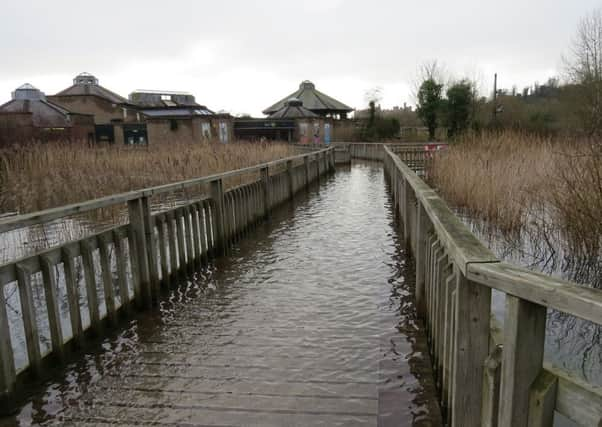WWT Arundel Wetland centre still affected by flooding


But for the WWT Arundel Wetland Centre, the effects of those floods have still not passed.
Run-offs from winter storms and the high tides on the River Arun have covered WWT Arundel Wetland Centre with water since December 26, 2013.
Advertisement
Hide AdAdvertisement
Hide AdLike many homes and businesses in Sussex, the wetland reserve faced the threat of flooding over the Christmas season, but the waters have still not subsided from the nature reserve outside of Arundel.
The wildlife charity has not been able to charge full price admission to the attraction because of the high waters levels.
“Our reedbed area does flood occasionally in winter but this year the entire reserve has faced high water levels for almost a month,” said WWT Arundel centre manager Dave Fairlamb. “The visitor centre building was only inches away from flooding.”
The River Arun overtopped its banks along the edge of the wetland reserve on January 3 for the first time in 20 years.
Advertisement
Hide AdAdvertisement
Hide AdHigh tides of 2.7 metres with strong winds pushed the river over a 30 metre stretch of bank spilling into the wet grassland inside the reserve.
High water levels on the Mill Stream opposite brought water into the reserve’s reedbeds.
Small streams of water have also come at the reserve across Mill Road.
Persistent rain has added to the problem – immediately adding water to the site with the delayed effect of rainwater coming through the chalk cliffs of the Offham hangar up to three days after every heavy rainstorm.
Advertisement
Hide AdAdvertisement
Hide AdWWT Arundel has remained open for visitors most days, opening and closing sections of the reserve as water levels go up and down.
The reserve had to close completely on January 8 and 9.
WWT staff have also had to cope with flooding in the exhibits that house the captive bird collection at the centre.
Staff had to wade around to feed them twice a day and sections of the reserve were closed to allow the collection birds access to pathways and land as their pens disappeared underwater.
WWT warden Samantha Halpin said: “Wildfowl do like a swim but they need time to roost on land out of the water, too. Also the geese in our collection require grass to graze on as part of their diet.”
Advertisement
Hide AdAdvertisement
Hide AdHowever, WWT staff said wild birds had benefitted from the high waters in the Arun Valley.
Many are ‘spoiled for choice’ for feeding spots as ponds have appeared in many places.
WWT Arundel is reporting extremely high numbers of gadwall feeding onsite.
However, grey herons and shovellers, which prefer shallow water, have moved off the reserve as a result of the flooding.